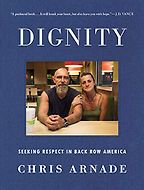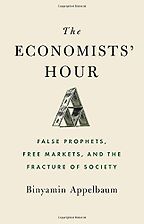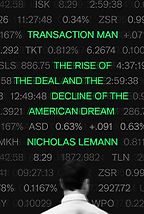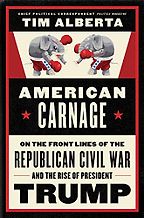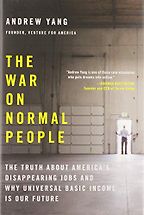Before we discuss the books you chose: 2019 is your 51st year in politics. As a kid, you appeared in a campaign ad, your mother was a campaign aide for Robert Kennedy, and your dad was a Washington Post reporter. Now, after covering politics for The New York Times and The Wall Street Journal, you’re at the helm of CNBC’s political coverage and a political analyst at MSNBC. After 50 years in politics, how will you remember 2019?
I think of 2019 as a year in which the country grappled, more seriously than it has before, with the changing underpinnings of the American dream. That’s the unifying thread of the books that I selected. There’s been a strong undercurrent of discontent in American politics for a long time that’s partly cultural and partly economic.
“There’s been a strong undercurrent of discontent in American politics for a long time”
That discontent results from the inability of American life to deliver the security, living standards, and hope for the future that Americans once took for granted. That same discontent contributed to the election of President Trump and it’s contributing to discontent with him, as Democrats try to figure out ways to harness it in the 2020 elections.
Moving on to your books, your first choice is not overtly political. Tell us about Chris Arnade’s Dignity: Seeking Respect in Back Row America.
Dignity captures the raw material of what we’re talking about. It’s comprised of photography with accompanying text written by a disaffected former Wall Street guy with a PhD, trying to understand the gap between his world of affluent finance professionals and the world of people struggling to get by.
He began this work by visiting a neighborhood in the Bronx. His hunger to understand inequality took him to McDonald’s and other community gathering spots around the country, from the Bronx to Bakersfield, California. His photographs and essays allow the people left behind by affluent America to define themselves. He leaves us with the question: How can we bridge the gap between front row and back row America?
In its review, The Economist wrote, “Dignity is ‘about’ inequality in much the same way that James Agee’s Let Us Now Praise Famous Men—a seminal study of tenant farmers in Alabama, illustrated with stark photographs by Walker Evans—was ‘about’ the Great Depression. Both works illuminate the reality of political and economic forces that might seem familiar in outline, by showing their effects on ordinary people.”
Seeing the people in Dignity, period, is important because of the way our lives are organized. Our professional and personal circles are circumscribed: our children hang out with children of people like us; we travel among people like us. When we see pictures of people wheeling their kids in shopping carts while they collect discarded cans on the streets to recycle for coins to make ends meet, it reminds me that, as Arnade relays in his book, we have similar hopes and emotions. The chasm is between the realities and opportunities of life in front row and back row America.
New York Times columnist Binyamin Appelbaum’s The Economists’ Hour is your next choice of 2019 politics books.
Binyamin’s book provides the intellectual backstory for how we got to where we are today. Community life has frayed. Instead, we pursue prosperity individually believing that striving individually will provide greater prosperity for the entire society. That belief is the organizing principle for government and the private sector alike. This fraying is destabilizing society. That’s what we’re grappling with right now.
How does The Economist’s Hour tell that story?
Binyamin writes about how people like Milton Friedman popularized shareholder capitalism, the belief that American corporations should be responsive almost exclusively to the people who own them, rather than the communities where they operate. That was a landmark shift. He also explains how market principles, efficiency principles, influence a wide range of other spheres of American life, such as the question of whether we should have a draft or an all-volunteer army during or after the Vietnam Era.
He documents the pervasive and profound influence of market principles on American life. That influence has upsides: increased global prosperity has reduced poverty around the world. But within industrial societies, it has immiserated the people with less opportunity, who are pushed aside as the most fortunate move ahead.
The next book on your 2019 politics list is Nicholas Lemann’s Transaction Man, which sounds some similar themes. What does he set out to do in this book?
Nicholas Lemann is one of the most brilliant people writing on American politics and journalism. He explains the historical context for the atomization we’ve experienced—how from the Depression a school of thought emerged that to achieve a balance of interests for society’s benefit, big business needed to be countered by big government and big labor.
“Silicon Valley companies have become behemoths that dominate their markets—often at the expense of consumers and ordinary workers”
He shows that in recent decades, that balance has been thrown off. America has become a more transaction-oriented society, in search of higher returns and more profit. He tells that story through the travails of an auto dealer in Chicago, whose dealership gets shut down as part of the auto industry bailout that followed the 2008 financial crisis.
Lemann, like Chris Arnade, is looking for ways to help the casualties of our economy. He looks at how Reid Hoffman, a LinkedIn executive, exemplifies the desire in Silicon Valley to have virtual networks replace communal institutions, and how those same Silicon Valley companies have become behemoths that dominate their markets—often at the expense of consumers and ordinary workers. Lemann is looking for ways to reconstruct connections among Americans to produce a fairer society.
What is the book’s most interesting takeaway?
I enjoyed learning about how Adolf Berle changed the world through force of argument. Berle, a corporate governance expert who became a member of Franklin Delano Roosevelt’s brain trust, persuaded the President that government was necessary to temper the forces of unfettered competition. FDR, in turn, persuaded America. Berle helped forge the New Deal’s new bargain between government and business, which America once embraced and no longer does.
Next we have a grizzly title, American Carnage. Tell us about it.
Tim Alberta writes about the evolution of the Republican Party from a party motivated by conservative goals, like smaller government, to a party that’s populist in orientation and heedless of the post-World War Two conservative consensus on free market and other principles.
“A civil war was underway within the Republican Party well before Trump came along”
Alberta’s book contains a wealth of deeply reported detail on the clash between Tea Party Republicans, who coalesced in opposition to President Obama, and classical Republicans, like former House Speaker Paul Ryan. Alberta shows that a civil war was underway within the Republican Party well before Trump came along.
Do you part ways with Alberta’s account at all?
I think he gives short shrift to the role of race in Trump’s Republican party. Studies have shown that racial resentment was strongly correlated with support for Trump. Racial resentments have been critical to the rise of Republicans ever since National Democrats embraced the Civil Rights Movement in 1960s, prompting a shift of culturally conservative whites towards the Republican Party. Nevertheless, Alberta nails the details of the current fracture among Republicans.
Finally, your last choice of this year’s political books is by a 2019 Democratic primary candidate. It’s far from a political memoir. What is The War on Normal People by businessman Andrew Yang about?
Andrew Yang’s book is another take on the forces fraying America’s middle class. He draws our attention to eye-popping data points about where our economy is heading, such as the threat artificial intelligence and automation poses to huge numbers of jobs. For example, truck driving—which, Yang notes, is the leading occupation in 29 different states—could soon be done by self-driving vehicles. Yang argues that the changes to come in our economy may have consequences of far greater magnitude than the changes that have resulted from computers so far.
Five Books interviews are expensive to produce. If you're enjoying this interview, please support us by donating a small amount.
There’s a lot of focus in The War on Normal People on how trade deals and outsourcing exacerbate the problems of the American middle class, but so many repetitive motion jobs and routine information-based jobs may soon be done better by AI. Even jobs high up on the income scale, such as the work of highly trained, highly paid medical professionals like radiologists, are likely to be supplanted by software which can read X-rays more accurately than human beings.
As a matter of fact, Yang talks about how journalists who do routine reports—on, say, corporate filings—may soon be replaced by artificial intelligence. There are things that human beings can do that artificial intelligence can’t, but that sphere is shrinking. It’s pretty alarming.
Yang seems to be tapping into fears of automation as much as President Trump tapped into fears of immigration during his 2016 campaign. You know Yang, having interviewed him for Speakeasy With John Harwood. It seems like every consequential American political figure has sat down for your lunchtime interview series. What do you learn over lunch that you can’t learn by reading the books we’ve discussed?
The most significant thing you get is a better sense of politicians as people. One of the things that Andrew Yang has benefited from, which I experienced in person, is his sincerity. He acts like an average 44-year-old guy who has succeeded in business. The fact that he’s a normal person comes across.
Get the weekly Five Books newsletter
The other reason why I think Yang, who has never held any public office, has overtaken several senators and governors in polls is because he has an agenda designed to assist people who need help. He is concerned about what is roiling politics in 2019 and what many of the books we discussed are about: the hurt caused by Darwinian competition and the search for how we can make America a little less Darwinian.
See all the recommendations in our best books of 2019 series.
Interview by Eve Gerber
October 21, 2019. Updated: June 21, 2020
Five Books aims to keep its book recommendations and interviews up to date. If you are the interviewee and would like to update your choice of books (or even just what you say about them) please email us at [email protected]
